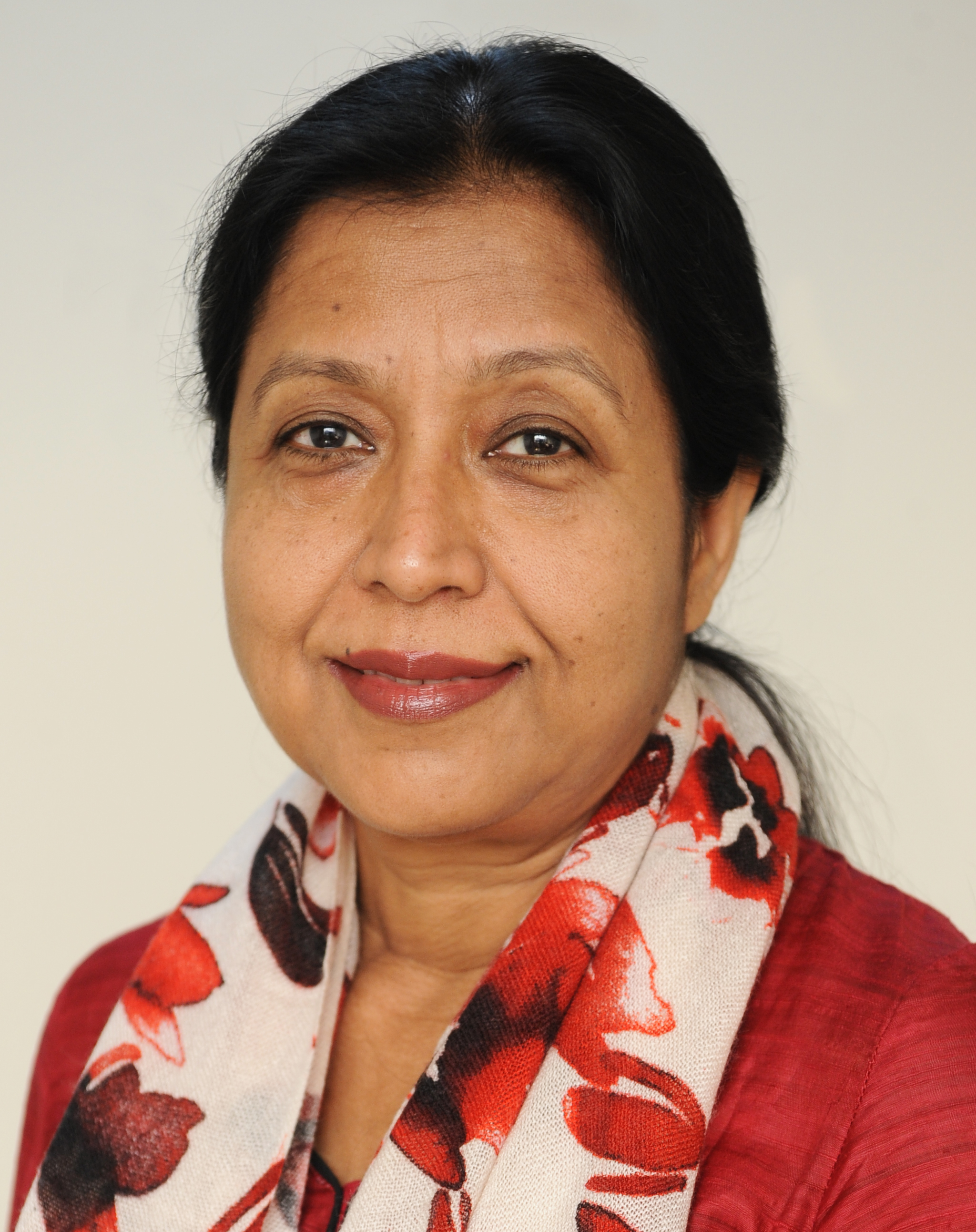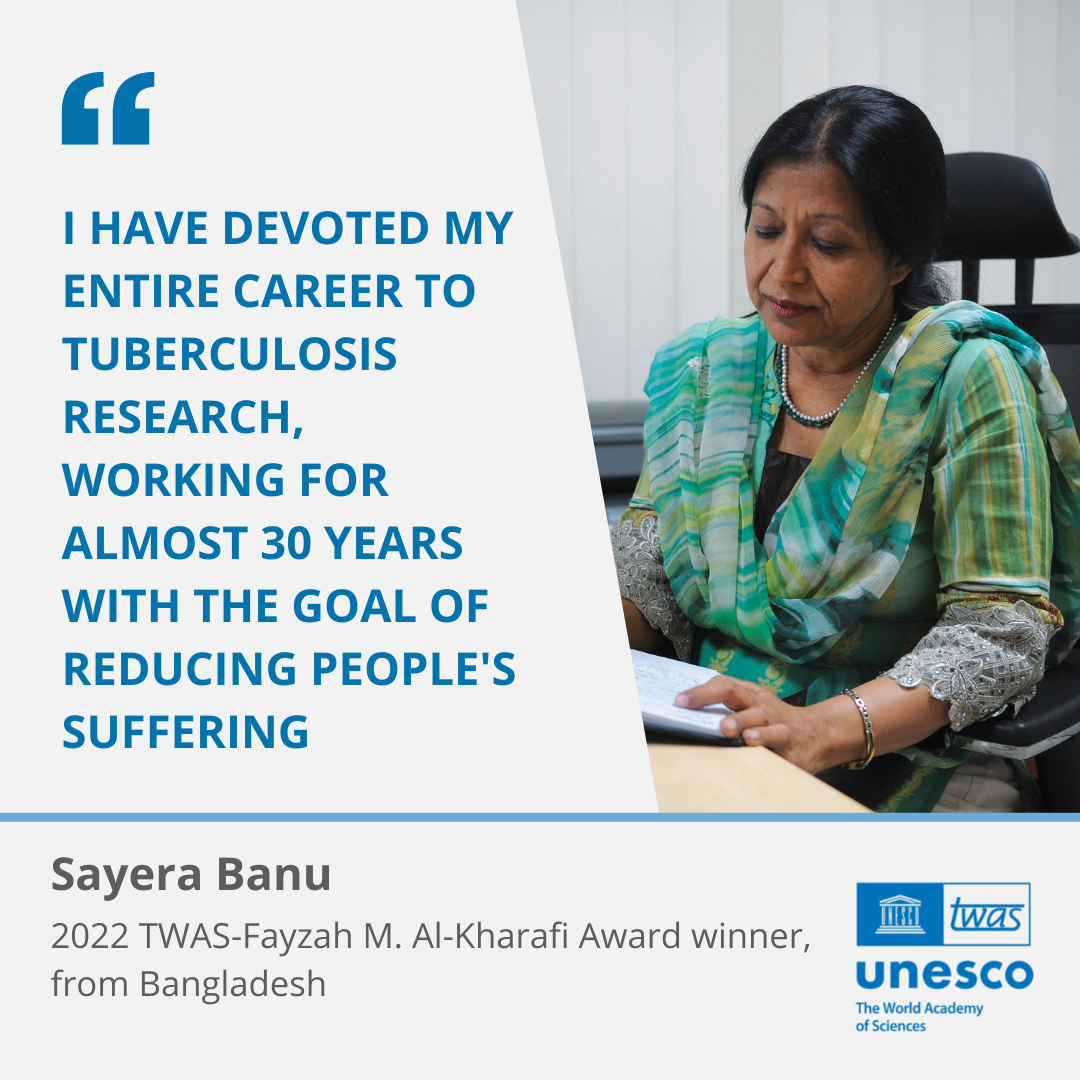
Despite a reduction in the number of people with tuberculosis (TB) registered between 2019 and 2020, Bangladesh is still a country where the disease is a major burden, accounting for 3.6% of the global total, according to the 2022 World Health Organization Global Tuberculosis Report.
Sayera Banu is a senior scientist and heads the Programme for Emerging Infections at the Infectious Diseases Division at icddr,b in Dhaka, Bangladesh—and she has been carrying out extensive studies on TB since 2001, with strong results. In fact, she innovated new techniques to isolate the TB-causing organism (Mycobacterium tuberculosis) and to contain antimicrobial resistance, which is currently a public health issue worldwide.
Banu's research informs Bangladeshi policies and programmes to reduce the burden of this disease, with clear successes to show for it. Over the years, more than 315,000 people were screened, over 40,500 new individuals were detected with TB, with more than 1,000 persons having drug-resistant TB from icddr,b TB Screening and Treatment Centres (TBSTCs) alone.
For her ground-breaking research on TB and its effective translation into policy and practice, TWAS bestowed on her the 2022 TWAS-Fayzah M. Al-Kharafi Award. The award was shared with the Syrian biotechnologist, Nadia Haider, a research director with the Department of Molecular Biology and Biotechnology of the Atomic Energy Commission of Syria (AECS) in Damascus, Syria.
"I have devoted my entire career to TB research, working for almost 30 years with the goal of reducing people's suffering," Banu said. "The 2022 TWAS Fayzah M. Al-Kharafi Award not only encourages me to continue my work, but is inspiring for young scientists, especially female scientists, to follow scientific paths and strive towards making advancements in building a better world."
TB management in Bangladesh
Banu, a medical doctor by training, earned a master's degree in microbiology at the University of Tsukuba, in Japan (1997) and completed her postgraduate training at the Institute Pasteur, in Paris (2000). She earned her PhD in medical microbiology earned from the University of Dhaka, in Bangladesh, in 2003 and now serves as a senior scientist with the Infectious Diseases Division, where she leads the Programme for Emerging Infections.
Early in 2001, before completing her PhD, she began establishing at the centre what is now, in her words, the best TB laboratory in Bangladesh, with cutting-edge studies that merge epidemiology, diagnostics, transmission, immunology and genomics of TB.
The lab now has a staff of 20 researchers, and the molecular microbiological methods that she introduced not only allow the rapid identification of TB bacteria from human specimens, but are also used by other Bangladeshi organizations and institutes.
Innovation in TB diagnostics
"In the beginning, our work on TB included exploring alternative diagnostics to increase TB detection," she explained. "Usually, researchers will test sputum coughed from people's airways. But this is difficult to collect from children, making pulmonary tuberculosis (PTB) hard to detect."
This prompted Banu and her team to optimize another processing method based on stool analysis. The results were published in the international peer-reviewed journal Clinical Infectious Diseases, in 2018, and prompted Banu to apply this method to a wider population of children, through a study funded by the USAID's Research for Decision Maker's Activity, a five-year implementation research project aimed to increase the use of evidence-based research and policy analysis for better health planning and decision making.
"As the next step, we implemented the technique by applying it to stool collected from children of 0-15 years of age with symptoms suggestive of PTB. What we found was that testing of stool specimen was a promising approach for childhood PTB diagnosis," she maintained.
In the last decades, Banu led various initiatives that marked important progress in TB treatment in Bangladesh. In 2007, she supervised the National TB Prevalence Survey, which was vital in informing the government about the TB situation in the country. It was the first such survey conducted since the early ’70s.
Monitoring TB multi-drug resistance
Among her accomplishments, there is the first-ever multi-drug resistant TB surveillance in Southeast Asia, which she and her team organized and conducted, which helped develop a picture of the actual scenario in Bangladesh and in the region. Multi-drug resistance is a severe problem with TB: due to the excessive use of two common antibiotics administered to patients worldwide, the micro-organism has become resistant to isoniazid and rifampicin, the most potent and prescribed drugs so far.
In addition, for the first time in Bangladesh, she introduced a new platform for rapid and accurate detection of TB drug resistance, called Targeted Next Generation Sequencing, which is proving to be a valuable tool for decision-makers to understand the pattern of TB drug resistance. And to increase the notification from the private sector, under the guidance of the National Tuberculosis Control Program (NTP), she launched a digital platform named Janao (which means "Inform" in Bangla) that is helping private practitioners stay connected and notify the NTP persons on treatment for the disease.
A meaningful success in her efforts against this disease came when Banu developed an interest in the jail population of Bangladesh. "Jails are very crowded and the jailed population is very vulnerable," she observed. "Poor ventilation and a high percentage of drug abusers make the prisons breeding grounds for infectious diseases such as TB." By studying the prevalence rate of TB in Dhaka jails she was able to inform the NTP and kickstart new actions to reduce the burden.
The impact of her efforts to contain TB in Bangladesh is proven by some telling data. She helped establish a network of TBSTCs to bridge the gap between the public and private sectors. Almost 13,500 physicians from 2,000 public and private healthcare facilities, and nearly 2,100 pharmacies across four major metropolitan cities of Bangladesh—Dhaka, Chattogram, Sylhet and Rajshahi—are now interconnected.
Cristina Serra


